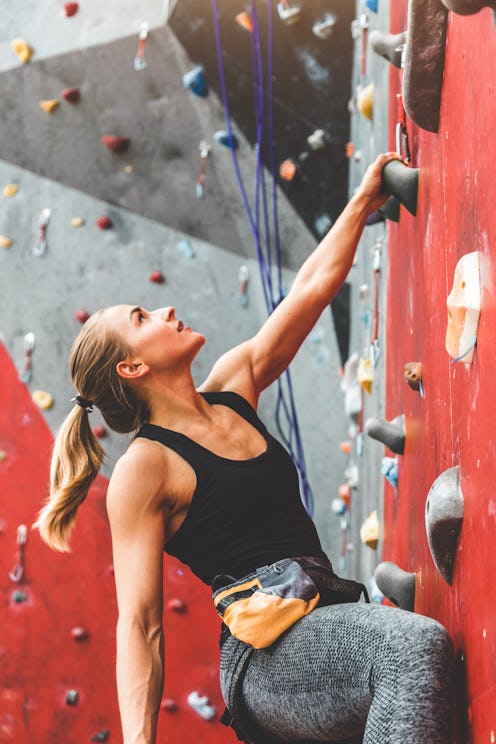Shutterstock
Indoor rock climbing is way more than a fun weekend challenge with friends. Whether you boulder or use ropes, climbing is a solid way to stay active, build some muscle, and give yourself a confidence boost, says Blaikley Thompson with Cultivate Climbing. Here’s what to know.
Erik Isakson/Tetra images/Getty Images
It Works The Arms
To start with the most obvious, you’ll definitely work your arm muscles while climbing, Thompson says. Your forearms engage the most as you move up and around the wall, adds personal trainer Steve Theunissen. But the triceps and biceps get some action, too.
Dedy Andrianto/E+/Getty Images
It Strengthens Legs
Even though it seems like you’re hanging on with your arms, you also need to use your legs to push up and reach for foot holds. Specifically, Theunissen says climbing engages your glutes, quads, hamstrings, and calves as you scale the wall.
John Fedele/Tetra images/Getty Images
It Builds Back & Core Strength
“One of the best exercises on earth for building a strong back is climbing,” Theunissen says. The reason? It utilizes your lats and traps — as well as the muscles of your core — as you twist, reach, and pull.
Don Mason/Tetra images/Getty Images
It Boosts Cardio
Tired of jogging on a treadmill? According to Thompson, scaling a rock wall is also a great way to build your endurance and boost cardiovascular health. It can take a while to reach the top, so you’ll definitely break a sweat.
Shutterstock
It Improves Your Grip
Another nice perk — especially if you struggle to open jars — is extra grip strength. According to trainer TJ Mentus, rock climbing challenges and strengthens your grip as you hang onto holds. Stronger forearms help, too.
Shutterstock
It Improves Mobility
Once you find yourself reaching a toe towards a faraway foothold, you’ll see that climbing really does improve your mobility and flexibility, Thompson says. Once you’re off the wall, it’ll feel like you got a good stretch in.
Shutterstock
It Boosts Problem Solving
Unlike running or cycling where you repeat a pattern, climbing taps into your problem-solving skills by introducing unique obstacles during each climb, says indoor rock climbing expert Matthew Levy. The path upward is like a puzzle, after all.
Shutterstock
It Gives You A Sense Of Accomplishment
Climber and psychologist Stephanie Freitag, Ph.D. says there’s even more to the mental side of climbing. Successfully getting to the top of a wall can help you feel more confident, especially if you were nervous or unsure at the start.
Satoshi-K/E+/Getty Images
It Can Help You Overcome Anxiety
If you’re afraid to even approach the wall, climbing up a few feet — or reaching the top! — is a great way to face your anxiety head-on. “It's basically exposure therapy for social anxiety, perfectionism, and failure,” Freitag tells Bustle.
Shutterstock
It’s Meditative
Climbing is meditative, too. “You’re able to use the rock as a mirror,” Thompson says. “It’s an outlet to face your fears.” Focus on your breathing, stay present in your body, and it basically becomes a moving meditation.
Shutterstock
It Brings A Sense Of Community
Whether you’re climbing the wall or holding someone else’s ropes, rock walls are full of ways to interact with others. There also tends to be a strong sense of community, Freitag says, since you’re surrounded by people who share the same passion.
